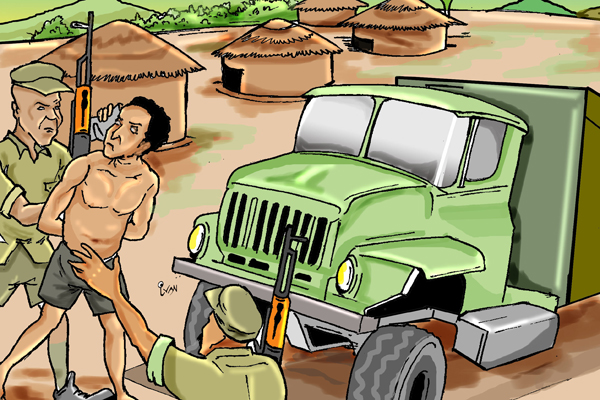Ankole administrator arrested in swoop targeting Fronasa agents

What you need to know:
Francis Xavier Tibayungwa was picked up from his office in Mbarara Town and led away to Simba Barracks. Because of the brutality the Idi Amin regime had subjected Ugandans to, little effort was put in looking for Tibayungwa, writes Faustin Mugabe
During Idi Amin’s reign that lasted eight years, hundreds of Ugandans were arrested and have never been seen again. One such unlucky Ugandan was former Ankole Kingdom administrative secretary Francis Xavier Tibayungwa.
Tibayungwa was kidnapped by Brig Ali Fadhul, then commanding officer of the Simba Battalion based at Mbarara Barracks, in 1972.
Tibayungwa was arrested on suspicion of being a member of the Front for National Salvation (Fronasa), a rebel group led by Yoweri Museveni.
Between 1971 and 1979 when the regime finally collapsed, Fadhul had served the government in different capacities. He served as battalion commander, Governor of the Northern Province, minister for Provincial Administration and during the 1979 war, months before Kampala fell, Amin sacked his chief of staff, Maj Gen Yusuf Gowon, and replaced him with Brig Fadhul.
Museveni rebels attack Mbarara barracks
On September 16, 1972, Ugandan rebel groups fighting to restore former president Milton Obote attacked Uganda from Tanzania.
The rebels attacked Mbarara and Rakai towns. Museveni was in the group that attacked Mbarara.
On Page 65, in his book, Sowing the Mustard Seed, President Museveni writes about their encounter with Ali Fadhul, the Simba Battalion commanding officer.
Fadhul was on his way to assess the situation at the Uganda-Tanzania border having received intelligence about the imminent invasion by the enemy from Tanzania when he encountered the convoy of the advancing enemy.
“From Nshungyezi, we turned right towards Mbarara and almost immediately we encountered the commanding officer of Amin’s Simba Battalion, based in Mbarara, driving towards us in a white Peugeot 504,” President Museveni writes.
“Because of the confusion inherited in the whole operation, there were no procedures in place regarding how we should react to any vehicles we might encounter on the way. There was, therefore, total chaos when someone noticed that the Peugeot was carrying people in uniform.
“Amin’s commanding officer, known as Ali Fadhul, was about to stop in despair, but when he noticed the confusion in our convoy, he decided to drive on at full speed, passing us and heading for Kikagati. It was a lucky escape for him; he is now in prison, having been tried and convicted for crimes he committed when he joined his unit after the invasion had failed. We drove as fast as we could towards Mbarara.”
The rebels were in a convoy of nine Bedford lorries, according to Museveni. The rebels who attacked Simba Barracks in the mid-morning surprise raid were repulsed by the Uganda Army in less than six hours in a single battle.
After the encounter, Amin and his commanders went to the situation room to review what really happened before, during and after the attack.
From intelligence, it was revealed that Tibayungwa had contacts with Museveni whose Fronasa rebels had participated in the Simba attack.

Former president Idi Amin. PHOTO/FILE
Tibayungwa kidnapped
On September 21 and 22, 1972, there was a security swoop that targeted Fronasa associates in Mbarara District in south-western Uganda. During the operation, a number of people were arrested. Among them was Tibayungwa.
He was picked up from his office in Mbarara Town and led away to Simba barracks. Because of the brutality Amin and his henchmen had subjected Ugandans to, often relatives and friends of the victims feared or never bothered to look around for their loved ones. Little effort was put in looking for Tibayungwa.
Fadhul sentenced
When the National Resistance Movement (NRM) government came to power in 1986, they emphasised the protection of human rights and promised to investigate the cases.
In 1987, Fadhul was arrested. He first appeared in court in February 1988 and was charged with the kidnap and murder of Tibayungwa before the High Court in Mbarara. He was represented by his lawyer Joseph Mayanja.
Several witnesses testified against Fadhul. They included Leo Kabuchura, 49, a sales manager in Ibanda, and Albert Kashaba, 46.
Court heard that between September 21 and 22, 1972, Fadhul forcibly abducted Tibayungwa, bundled him into a waiting car and drove him to Simba barracks. It is said Tibayungwa was then killed on the orders of Fadhul.
Court heard that during Tibayungwa’s arrest, Fadhul accused him of being a rebel working with Museveni to overthrow the Government of Uganda.
In 1989, Justice Ignatius Mukanza sentence Fadhul to life in prison. Luckily, after 22 years of incarceration at the Luzira Maximum Security Prison, President Museveni pardoned Fadhul in 2009, who has since gone on to live a quiet life.




